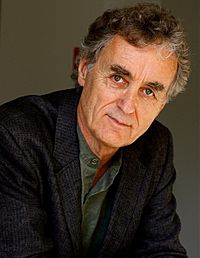Fritjof Capra facts for kids
Quick facts for kids
Fritjof Capra
|
|
|---|---|

Capra in 2010
|
|
| Born | February 1, 1939 Vienna, Austria
|
| Alma mater | University of Vienna |
| Known for | Ecoliteracy |
| Scientific career | |
| Fields | Physics, systems theory |
| Institutions | U.C. Santa Cruz, U.C. Berkeley, San Francisco State University |
| Writing career | |
| Notable works | The Tao of Physics The Turning Point |
Fritjof Capra was born on February 1, 1939, in Austria. He is an American author, a physicist (someone who studies how the world works at a basic level), and a systems theorist (someone who looks at how different parts of a system connect and work together). He is also known as a deep ecologist, meaning he cares deeply about the environment and how humans fit into nature.
In 1995, he helped start the Center for Ecoliteracy in Berkeley, California. This center teaches people, especially kids, about ecology and how everything in nature is connected.
Capra has written many important books. Some of his well-known works include The Tao of Physics (1975), The Turning Point (1982), and The Web of Life (1996). He also co-authored The Systems View of Life (2014).
Contents
Early Life and Education
Fritjof Capra was born in Vienna, Austria. He went to the University of Vienna and earned his PhD in theoretical physics in 1966. This means he studied the ideas and theories behind how the universe works.
Research and Teaching
After his studies, Capra did research in particle physics (the study of tiny particles that make up everything) and systems theory. He worked at several famous universities and research centers around the world. These included the University of Paris, the University of California, Santa Cruz, and Imperial College, London.
He also taught at universities like U.C. Santa Cruz, U.C. Berkeley, and San Francisco State University.
Exploring Science and Spirituality
Fritjof Capra is famous for writing books that explore big ideas about science and how they connect with other ways of thinking.
The Tao of Physics
One of his most famous books is The Tao of Physics, published in 1975. The book explores how modern physics and ancient Eastern spiritual ideas (like metaphysics) seem to lead to similar understandings about the world. Capra suggests that both science and spiritual traditions can help us understand the universe.
Connecting Science and Society
In the early 1980s, Capra became interested in environmental issues. He co-wrote Green Politics in 1984, which looked at how environmental ideas could influence politics.
He also helped write the screenplay for the 1990 movie Mindwalk. This film was based on his book, The Turning Point, and explored ideas about how we see the world and solve problems.
In 1991, Capra co-authored Belonging to the Universe with David Steindl-Rast, a monk. This book looked at how new ideas in science and religion might actually agree on many things about the universe.
Holistic Thinking and Ecology
Capra believes that we should look at the world in a "holistic" way. This means understanding that everything is connected and that we should study things as a whole, not just in separate parts.
The Web of Life
In his book The Web of Life, Capra explains that all systems, like an ecosystem or even our own bodies, are like a web. Every part is connected to every other part. He emphasizes that to truly understand something, we need to see how all its pieces relate to each other. This is different from the older idea of breaking things down into tiny pieces to understand them.
Promoting Ecoliteracy
Capra is a founding director of the Center for Ecoliteracy in Berkeley, California. This organization works to teach people, especially students, about ecology and systems thinking. The goal is to help young people understand how nature works and how they can live in a way that protects the planet.
He is also a member of the Earth Charter International Council. The Earth Charter is a declaration of basic principles for building a fair, sustainable, and peaceful global society.
See also
 In Spanish: Fritjof Capra para niños
In Spanish: Fritjof Capra para niños
- Arne Næss
- Center for Ecoliteracy
- Deep Ecology
- Ecoliteracy
- Ervin Laszlo
- Gaia hypothesis
- Gregory Bateson
- Hindu idealism
- Holism
- Systems theory
 | William M. Jackson |
 | Juan E. Gilbert |
 | Neil deGrasse Tyson |

